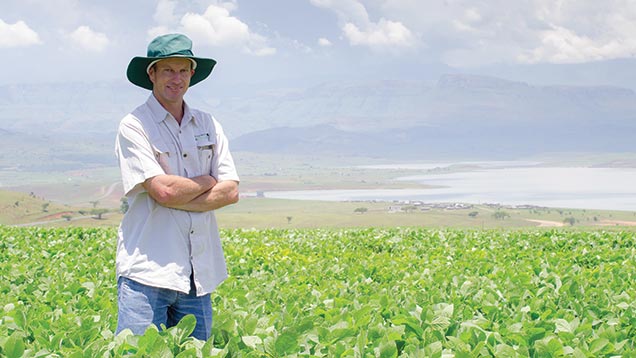Farmer Focus: Yield increases will come from soil organic matter
 © Karen Edwards
© Karen Edwards I recently visited a farm in the Democratic Republic of the Congo (DRC). As you can imagine, their challenges are enormous but, amazingly, their limitations to yield are the same as mine.
This is a huge, water-rich country – 3.3% of its area is covered by water compared with the UK, which only has 0.7% coverage. Rainfall is high and the soils run deep.
The area I visited is so far inland it is effectively landlocked. As for cropping, everything needs to be imported including the heavy, bulky stuff such as lime and fertiliser.
See also: Read more from our Arable Farmer Focus writers
As the soil has originated in a warm, high-rainfall area, it is highly weathered, low in fertility and very acidic.
At home in South Africa, I also have acidic soil – some of my soil is naturally acidic, similar to the DRC, and other soil has man-induced acidity.
This primarily comes from the overuse of nitrogen fertilisers, which don’t cause much acidity themselves but it is the nitrogen that escapes the root profile of the crop that acidifies the soil.
Lime solution
It doesn’t matter where your acidic soil comes from, the solution is the same, deep incorporation of lime.
Highly weathered soil is also low on macronutrients, such as phosphorus and potassium, and micronutrients, such as zinc and molybdenum.
This is all easily fixable, although it might not be cheap. It doesn’t matter where you farm, the basics stay the same.
Acidic soil inhibits root development, and plants with compromised root can’t access nutrients and moisture from the soil.
Soil deficient in essential nutrients will not yield. The next level in yield comes from increasing soil carbon.
Unlike lime and fertiliser there is no practical way to buy organic matter, you must grow it. Organic matter comes from no-tilling your fields together with growing cover crops.
Whether you farm in South Africa, the DRC or the UK, the next level in increased yield comes from increasing your soil’s organic matter content.
Bruce Shepherd farms in KwaZulu-Natal, South Africa. He plants 500ha of rain-fed summer crops across 3,000ha. He also runs 2,600 weaner oxen on pastures, finishing them in a feedlot with maize grown on the farm.

